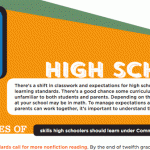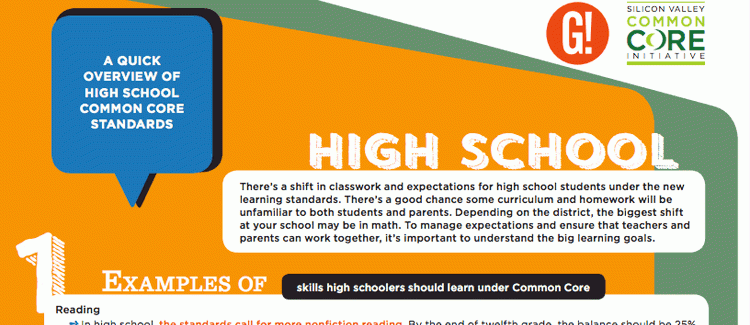A quick overview of Common Core Standards in high school
There’s a shift in classwork and expectations for high school students under the new standards. There’s a good chance some curriculum and homework will be unfamiliar to both students and parents. Depending on the district, the biggest shift at your school may be in math. To manage expectations and ensure that teachers and parents can work together, it’s important to understand the big learning goals. (Download our Common Core cheat sheet for parents of high schoolers.)
Examples of skills high schoolers should learn under Common Core
Reading
• In high school, the standards call for more nonfiction as children advance through high school. By the end of 12th grade, the balance should be 25% fiction (novels, plays, poetry) and 75% nonfiction (science, history, math, and other informational texts) reading.
• Identifying two or more central ideas and citing text-based evidence to support analysis both of what’s explicitly written and what’s inferred.
• Identifying an author’s point of view and analyzing the effectiveness and structure of the author’s writing.
Writing
• The standards stress stronger nonfiction writing. Students need to do more research and planning before they start writing.
• Students will know how to introduce an argument, develop and defend it, and present the information in an organized, logical sequence.
• High schoolers should use precise language, domain-specific vocabulary, explicit details, varied transitions, and techniques such as metaphors and analogies – all while maintaining a formal style and objective tone.
Math
• The standards emphasize learning math in the context of real-world situations and solving real problems. Nobody’s workday starts with the warning “Today we will be multiplying fractions.” It’s not how math classes should work, either.
• All students will be developing an integrated understanding of algebra, geometry, statistics, functions, and number sense. At some schools, these will be taught as separate subjects, but students will be expected to combine them when solving problems. At other schools, traditionally separated subjects will be brought into Math 1, 2, 3, and 4 classes that will bring together all subjects.
Building skills at home
• Challenge teens to try their hand at professional writing they’d find interesting or entertaining. Use prompts like: Write a monologue for Glenn Beck or Jon Stewart. Create two characters for a new video game and write their dialogue. Write a press release for a terrible-smelling perfume/cologne.
• Ask teens to create a budget. Based on an annual salary, have students figure out what’s left after taxes and how much to spend each month on necessities (shelter, food, transit, savings) and luxuries (entertainment, gifts, investments).
• Model how to break large assignments into smaller, more manageable pieces. Most real-world projects aren’t completed in a single day – neither are most big reports or school projects.
Why new standards?
• Can Common Core fix this problem? Check out this infographic showing how many high school graduates who go to 4-year colleges need to take remedial classes.






